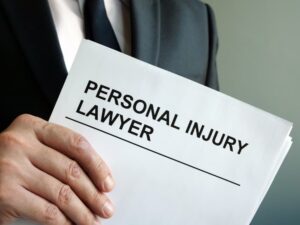There is a wide range of legal practice areas, each with its own focus and benefit for individuals needing representation. Depending on the type of legal matter you need help with, you should understand different types of law and what lawyer you will need to contact. Personal injury law is one of the most widely practiced legal areas, covering various cases. At a basic level, personal injury law addresses cases in which individuals suffer harm (physically and financially) due to the negligence of another party.
Personal injury law provides a vital service to injured parties who need protection for their rights and compensation for the damage they have sustained. This area of law acts as a crucial mechanism for seeking justice in the aftermath of an injury-causing accident. By pursuing a personal injury lawsuit, an injury victim can seek financial compensation that can help them pay medical costs, cover lost income due to an inability to work, and provide relief for pain and suffering.
If you or a loved one has suffered an injury in an accident that another party caused, you have the right to take legal action through a personal injury lawsuit to seek a fair resolution for the harm done to you. By working with an experienced personal injury lawyer, you can take the appropriate steps toward a result that can help you put this unpleasant ordeal behind you and allow you to move forward.
Trusting a knowledgeable personal injury attorney in Phoenix can give you both peace of mind throughout the legal process and confidence that your rights will be protected and your best interests will remain the priority as you pursue a resolution. Reach out to a lawyer for help to schedule a consultation.
Overview of Personal Injury Law

By definition, a personal injury is any physical, emotional, or financial damage suffered by a person due to the actions or negligence of another party. While these different types of damages all fall under the umbrella of personal injury law, they are separated into different categories and are separated into different classifications of compensation. Some things that might be compensable include:
- Physical Injuries — Various types of bodily harm can result from accidents, including fractured bones, soft tissue injuries or tears, spinal injuries, or head injuries.
- Emotional or Psychological Injuries — Though less tangible than physical injuries, emotional and psychological injuries are no less serious and can include mental trauma, anxiety, post-traumatic stress disorder, and other conditions.
- Financial Losses — Physical and emotional injuries often result in subsequent financial harm, such as significant medical bills, lost income, and property damage. These losses form the foundation for the compensation injured parties are seeking.
Any one or more of the types of damages listed above may be part of an individual’s personal injury lawsuit. Your personal injury lawyer can work with you to assess the types of damages you have suffered and build your case accordingly.
Types of Personal Injury Compensation
Financial damages in personal injury cases fall into different categories: economic damages, non-economic damages, and punitive damages, which apply to the different types of injuries suffered by the plaintiff. A basic understanding of these different types of compensation can be helpful.
- Economic Damages — Medical expenses, lost income, and property damage that can be easier to assess and quantify fall into this category.
- Non-Economic Damages — Other forms of harm, such as pain, suffering, and emotional distress, may be more difficult to diagnose but are no less real or compensable.
- Punitive Damages — In cases of gross negligence or intentional misconduct, the court can sometimes award punitive damages, which punish the responsible party and serve as a deterrent.
Depending on your specific accident and the injuries and damages you may have suffered, your case may have you seeking multiple types of damages. Your personal injury attorney can guide you and explain the different options regarding your specific case.
Legal Foundation of Personal Injury
From a legal standpoint, personal injury law is under the umbrella of tort law. Tort law is the area of law that deals with civil harm as opposed to criminal law or other legal matters. While criminal law focuses on punishing offenders, tort law is concerned with resolving disputes between private parties and compensating parties that have been wronged.
Tort law depends on the principle that individuals and businesses have a duty not to inflict harm upon others, either through actions or negligence. When this duty gets breached and results in one party suffering harm, the wronged party may have grounds to seek compensation through the law. Understanding this basic framework is beneficial when pursuing a resolution in a personal injury case.
Proving Negligence
Negligence is a key part of personal injury law, as proving the responsible party was negligent is crucial for winning your case and obtaining compensation. The following elements are steps in the process of proving negligence:
- Duty of Care — As an injury victim, you must first establish the fact that the party alleged to have been responsible for the accident owed the injured party a “duty of care” to protect them and avoid causing harm.
- Breach of Duty — You must show that the responsible party breached their duty of care to the injured party, either through intentional action or by failing to act.
- Causation — You must demonstrate that there was a direct link between the defendant’s breach of duty and the injuries suffered by the plaintiff.
- Damages — Tangible, quantifiable damages or losses as a result of the defendant’s breach of duty are necessary for an injury claim. These damages can include both economic and non-economic losses.
If the fundamental elements listed above can be proven, you will have a strong case to show that the party you allege to have been responsible for your injuries was legally negligent, laying the necessary foundation for a successful personal injury case.
Common Personal Injury Cases
With personal injury law covering such a wide range of cases, it can be helpful to know more about some of the more common types of personal injury cases. Though virtually any type of accident that results in someone suffering injuries due to another party’s negligence can potentially produce a personal injury case, some of the most common types of personal injury claims include:
- Traffic Accidents — This type of case can include auto accidents, truck accidents, motorcycle accidents, bicycle accidents, pedestrian accidents, and other types of accidents that occur on the road with different types of vehicles.
- Wrongful Death — Any accident that results in an individual’s death has the potential to lead to a wrongful death lawsuit brought by the deceased individual’s family.
- Slip and Fall Accidents — Incidents involving premises liability in which someone suffers a fall on another party’s property, resulting in an injury. The responsible party can be a private resident who owns the property, a business, or even a government body.
- Product Liability Cases — When someone suffers harm by using a consumer product in its intended way and according to the manufacturer’s instructions, the injured party may seek to file a product liability lawsuit.
- Medical Malpractice — Though medical professionals are trusted to care for sick or injured people, there are sometimes mistakes made that end up harming the patients instead, which can result in a medical malpractice case.
- Dog Bite Cases — Along with other animal attack incidents, dog bites are a common source of personal injury cases.
- Catastrophic Injury Cases — Traumatic brain injuries, spinal cord injuries, burn injuries, and other serious but specific and complicated accidents fall into this category.
There may be a much longer list of potential personal injury cases, but the list above covers the common types. An experienced personal injury lawyer will have experience and insight into any of the cases listed above and will provide you with the strong legal representation you need to pursue your case.
The Role of Personal Injury Lawyers

It should be clear by this point that having a knowledgeable personal injury attorney working on your case should be your top priority. If you have suffered an injury in an accident caused by another party and have not yet contacted a personal injury lawyer, doing so as soon as possible is your best option. The aftermath of suffering an injury, not to mention the legal process itself, can quickly become confusing and overwhelming to those unfamiliar with such situations. When you contact a personal injury lawyer for help, you can receive the assistance and guidance you need, including:
- Initial Consultation — Sometimes conducted free of any charge, the initial consultation is an opportunity for you and your prospective attorney to get to know each other and the details of your case.
- Investigation — As part of building your case, your attorney will gather all available documentation and evidence pertaining to your case, including medical records, police reports, witness statements, photographic evidence, and more.
- Negotiation — If insurance companies are involved, having your lawyer handle all communication with insurers is always the best strategy.
- Filing a Lawsuit — Taking legal action and notifying the defendant of the pending lawsuit will officially begin the legal process.
- Discovery — In this phase, your attorney (and the legal representative of the other party) will gather evidence and build their arguments.
- Settlement or Trial — While many personal injury cases end in settlements reached outside of court, others actually do go to trial, which makes having an attorney with litigation experience vital.
Throughout every stage of the process, having a skilled personal injury lawyer working on your behalf will provide valuable benefits. Be sure to discuss billing and any contingency arrangements with your lawyer early on to know what you can expect financially.
Challenges in Personal Injury Cases
As you consider filing a personal injury lawsuit, you and your attorney should discuss and prepare for the potential challenges and obstacles that may arise during the process. With so much riding on the outcome of your case, being aware of the complications you may face is important. Some of the common challenges in personal injury cases include:
- Statute of Limitations — There is not an unlimited window of time to take legal action after an injury accident, so being aware of your state’s statute of limitations (which can vary depending on where you live) is a critical element.
- Insurance Tactics — Though insurance companies are often professional and helpful, there are instances when they will attempt to use tactics to put you at a disadvantage or damage your claim.
Your lawyer will be well-versed in these challenges and work with you to recognize them and develop strategies to counter them.
Trust an Experienced Personal Injury Law Firm for Help
Suffering a preventable injury in an accident can be an awful (and sometimes life-changing) experience. In addition to the physical pain you’ve endured, you may also be facing mounting medical bills, the inability to work to maintain your income, and other expenses. Personal injury law provides a legal avenue to pursue relief from these challenges and obtain compensation to give you the financial assistance you need. With the help of a skilled personal injury lawyer, you can file a lawsuit that seeks to hold the responsible party accountable for your injury.

Your personal injury attorney will take the time to investigate the details surrounding your accident, assess the damages (both physical and financial) you have sustained, explain the legal options available to you, and lead you through every step of the process. An effective personal injury lawyer will be attentive to your concerns and remain available to answer your questions and keep you informed of the developments of your case.
If you have been in an accident that left you injured, contact an experienced personal injury lawyer today to schedule a consultation and begin the process of taking action to hold the responsible party accountable. A successful personal injury case can provide you with much-needed financial help to pay your medical costs, cover income you lost, and compensate you for your pain and suffering. Don’t face your challenges alone; get help from a trusted personal injury attorney near you today.